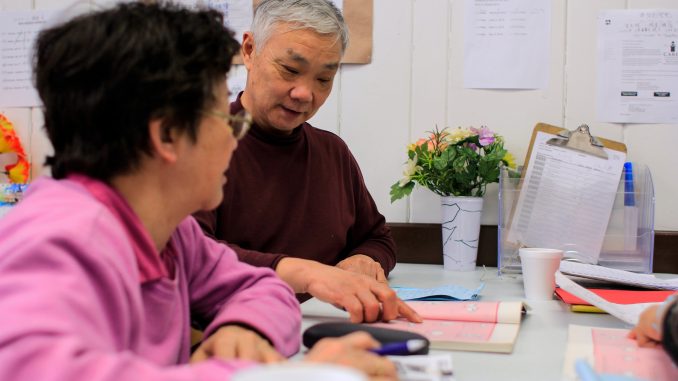
In 1979, fresh after receiving her Ph.D. in organizational development and group dynamics from Temple, Nancy Henkin wanted to use her newfound knowledge and apply it to aging.
The Intergenerational Center was the result.
“I saw lots of older people who weren’t honored for their achievements and kind of pushed aside,” said Henkin, who still serves as executive director of the center. “I realized that our communities are very age-segregated and that there are very few opportunities for generations to interact in meaningful ways.”
Today, that includes several programs with student participants, like Project SHINE, through which students can help teach older immigrants the English language. There is also Time Out Respite Program, where students give regular caretakers a break via a helpful visit.
And that vision of meaningful interaction between generations has survived through the terms of five university presidents.
It’s also survived a move to the College of Education, months after the College of Health Professions and Social Work underwent a reboot and became the College of Public Health, jettisoning two majors and adding three. To accommodate the college’s growth, the Visualize Temple plan includes a new building for it, to be located next to Weiss Hall.
“We try to go where we feel there’s a good fit,” Henkin said of moving to COE. After the change to CPH, “the alignment [of the IGC’s needs and the school’s goals] wasn’t as clear,” Henkin said.
For 21 years, the center held annual cross-generational retreats at Ambler Campus, which spurred many of the programs that are part of the center’s lineup today.
“We learned the importance of creating a safe environment to help people of all ages and backgrounds find commonalities and celebrate differences,” Henkin said of the retreats. “We also learned that most people yearn for a sense of community and want to bridge the generational divide.”
Henkin said taking care of the aging population will become more necessary with nearly 77 million baby boomers in the country. Every seven seconds, an American turns 50 years old, she said.
Sikiya Horton, a senior criminal justice major who grew up in Fairmount, said that as part of the Time Out Respite Program, she makes frequent visits to assist a blind woman.
And she learned something that surprised her – while she assumed that most blind people were given seeing eye-dogs, the process was more complicated than she initially thought. The woman she visits didn’t have one.
“There’s a lot of paperwork,” Horton said. She added that the process of acquiring a seeing-eye dog can cost as much as $700, and the woman is on track to have a dog soon.
Horton said she’s learned some lessons from her experience.
“I’ve learned how to be patient,” Horton said. “I’ve learned how to look at life differently.”
Joe Brandt can be reached at jbrandt@temple.edu, 215.204.7419, or on Twitter @JBrandt_TU.



Be the first to comment